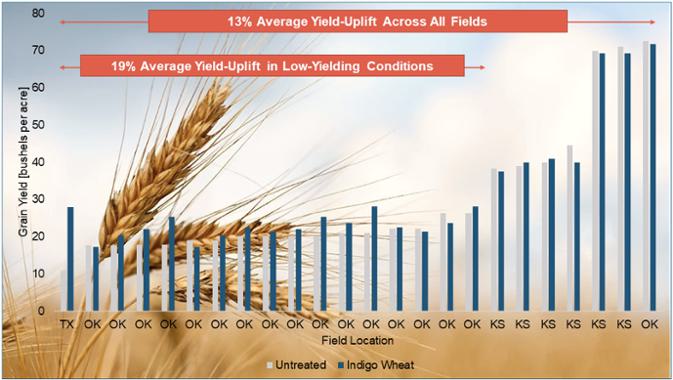News 07.10.2018
Indigo Wheat™ Demonstrates Continuous Improvement with Significant Yield Gains in Second Commercial Season
- Indigo Wheat™ demonstrated average yield gains of 19% in low yielding conditions and 13% across all conditions
- Improving upon last year’s yield gains of 16% in low yielding conditions and 8% across all conditions, 2018 reflects year-over-year improvement, validating research and development approach
Boston, Massachusetts, July 10, 2018 – Indigo Ag, Inc., a company dedicated to harnessing nature to help farmers sustainably feed the planet, has released an early view on yield data from its microbial seed treatment for wheat. In its second commercial season, Indigo Wheat™ demonstrated an average yield uplift of 13% in side-by-side trials held on 24 fields, with four popular seed varieties across Texas, Oklahoma, and Kansas showing a win-rate of 62.5%. Under higher-stress, low-yielding conditions, the average yield uplift was 19% with a win-rate of 76%.
In these side-by-side trials, Indigo Wheat was compared to the same hard red winter wheat variety minus the proprietary microbial seed treatment. Management practices were consistent across treated and untreated acres. Indigo Wheat achieved higher yields without increased water or chemical use.
The results confirm the continuous product improvement enabled by Indigo’s R&D approach. In the 2017 harvest, Indigo Wheat demonstrated an average yield improvement of 16% in low yielding conditions and 8% across all conditions in the water-stressed target region of Kansas. The seed treatment, developed from naturally occurring, in-plant microbes, increases the productivity of wheat plants by improving plant tolerance to water stress.
Jon McIntyre, Head of Research and Development at Indigo, reflected on these results: “We’re setting a precedent for consistent performance in our product portfolio. Starting with Indigo CottonTM and continuing in Indigo Wheat, we’ve seen significant improvement season-to-season. Our R&D approach has allowed Indigo Wheat to increase its yield uplift potential by 62.5% across all conditions in under a year. I feel confident that we can continue to raise the bar, for both ourselves and the industry at large.”

Indigo’s strong yield results occurred during a season where rainfall across locations totaled 24% less than the five-year average. In 2018, record-low precipitation combined with severe drought stress in the High Plains region drove Texas and Oklahoma wheat abandonment rates to historic highs of 66% and 54%, respectively.
Brandon Bush, an Indigo Wheat Grower based in Altus, OK, saw significant yield gains in his fields this past season. “We only had 1.4 inches of rain over six months. Everything around the field that wasn’t Indigo was 15 to 20 bushels per acre, but Indigo’s field harvested 33 bushels per acre. We had Indigo flags on our field that you could see from the road. At 65 miles per hour you could see there was something different about our field. Every neighbor was calling and asking, ‘What is Indigo?’”
In the fall, Indigo will publish an in-depth analysis of yield data with grain quality and environmental characterization from 50,000 acres of grower-contracted Indigo Wheat.
Hear more from growers of Indigo Wheat in this blog post from Rachel Raymond, Chief Operating Officer, Indigo North America.
ABOUT INDIGO
Indigo is a company dedicated to harnessing nature to help farmers sustainably feed the planet. With a vision of creating a world where farming is an economically desirable and accessible profession, Indigo works alongside its growers to apply natural approaches, conserve resources for future generations, and grow healthy food for all. Utilizing beneficial plant microbes to improve crop health and productivity, Indigo’s portfolio is focused on cotton, wheat, rice, corn, and soybeans. The company, founded by Flagship Pioneering, is headquartered in Boston, MA, with commercial and customer service based in Memphis, TN. www.indigoag.com
Contacts
Indigo
Lauren Ashbrook
+ 1 (857) 443-9416
Kwittken for Indigo
Margaret Manning
+ 1 (646) 747-9390